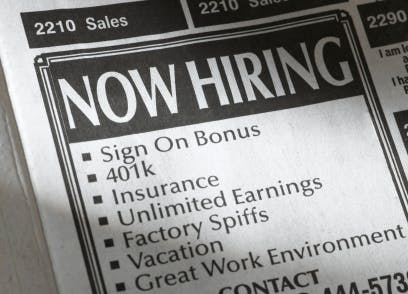The skill gap, or talent shortage (whatever you want to call it), is no longer this impending matter, because we now seem to be right in the middle of a talent drought for many high-skill positions.
Talent acquisitions specialists have been talking about this matter for quite some time. When the shortage will happen, why it will happen, what it will affect, but not so many of them discuss what to do about it.
In one camp, you have the “Denial isn’t just a River in Egypt” crowd, who steadfastly believes that the skills gap if any, is something that is part of an evolutionary shift in the workforce and the free markets will help to work it out. According to Atlantic reporter Matthew O’Brien:
We would expect wages to be rising much faster in sectors where employers can’t find enough qualified workers if a skills mismatch really was holding the economy back. But that hasn’t really been the case.”
In the other camp, you have doomsday prophets stating that the skills gap will kill this once great industrial nation, putting us far behind our global counterparts and at a distinct disadvantage on the worldwide stage.
With the New Year in full swing, this is a matter of extreme importance in the HR and recruiting world. What can be done from the perspective of hiring managers and recruiters to alleviate some of the pressure that a lack of relevant candidates can put on an organization?
Change the perspective
Firstly, the cut and dry perspective that a candidate must fit a job description should be done away with for many positions. If the candidate simply isn’t there, a recruiter can’t make them up.
This is more than letting go of the purple squirrel. We can’t just create candidates for positions; this is about creating positions for the candidate.
Concretely defined roles are helpful in a lot of ways, but they also are stifling. They can become boxes that the confine workers to their silo and leave little room for them to explore and use other strengths.
Those other strengths might even consist of extreme trainability. For years, HR professionals have been preaching to hire for attitude and adaptability rather than for skill. This started off as an idea, then became a best practice and it will now need to be done out of necessity rather than preference.
Create talent pipelines
Yes, I know, there’s nothing new about talent pipelines, recruiters have been building them for years. However, recruiters need to get more targeted and aggressive with building their supply chain.
Josh Bersin recommends partnering with universities and creating apprentice programs. This is a genius way to develop strong relationships with fresh talent, while planting the seed of a great employer brand.
Embrace and encourage development
It’s been said in many an article that you need to “Hire for attitude, and train for skills.” Sounds simple enough right? As a professional in both talent management and learning management, I can assure you, it’s not. A lot of ground work needs to be done to successfully turn an attitude into hard skills.
For example:
- Performance reviews have got to evolve. The way companies appraise their talent needs to drastically change. The focus can’t be on flaws and strengths. Reviews need to be goal oriented, with an emphasis on development. A strong push for continual growth will need to replace simple performance documentation.
- Companies are also going to have to up their efforts in recognition and engagement as well, and this needs to consists of more than surveys. Benefits, recognition programs and a strong mission will all facilitate career development.
- Upward mobility within the organization needs to start being a strong focus in HR. Consider opening positions up internally as a first resort. Many workers don’t even know these positions are available until they are filled externally. That is a waste of HR resources, time and training. A focus on making internal upward mobility easier and well communicated will really help companies save resources in this talent shortage. Furthermore, encouraging upward mobility is the same as increasing retention.
Many companies are still stuck on the “two-years experience required” mentality, even for entry-level positions. This demand for candidates with the perfect skill set is a luxury that companies no longer have.
Start combating the talent shortage with changing the perspective, building a supply chain for new talent and encouraging development in the current workforce.
